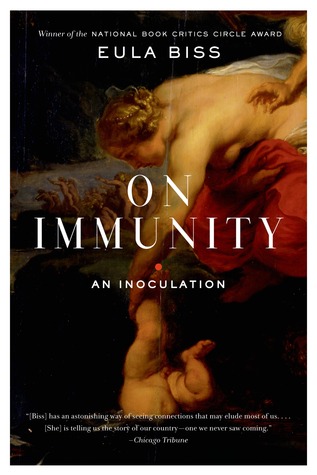This is a Review: On Immunity: An Inoculation, by Eula Biss
December 11, 2014 |
| Source: Goodreads |
Biss's writing style is easy. That isn't the word I'm looking for, but it fits. The words and ideas seemed to flow effortlessly into one another, taking us for a pleasure cruise even while Biss herself is struggling with questions that don't have easy answers. While the one you may expect is prominent (Vaccinate, or don't vaccinate?), there are swaths of other problems to chew on here: How can we discern "good" science from "bad"? Why do we (by we, I mean American society, as that's primarily what Biss examines) so often frame health as a moral topic (e.g., the healthy as "clean" and "pure," the unhealthy as "filthy" and "toxic")? How do we reconcile our individual needs with those of our communities? The thread that ties all this together is an anxious mother navigating bearing and raising her first child, slowly coming to the frightening realization that "we cannot make [our children] invulnerable any more than we can make ourselves invulnerable."
A scientist by training and social activist at heart, I especially enjoyed the sections about how health relates to issues of race, class and privilege (though we don't always like to admit it). She says early on:
"Debates over vaccination ... are often cast as debates over the integrity of science, though they could just as easily be understood as conversations about power." - p. 26An example: vaccination used to be mandated among the lower, poorer classes, to ensure that the wealthy were protected. Nowadays, Biss says, the middle and upper classes are expected to provide the herd immunity to protect children of poor families who may not have the time or resources to get them vaccinated on schedule. "This is a radical inversion of the historical application of vaccination," she says, "which was once just another form of bodily servitude extracted from the poor for the benefit of the privileged."
Biss also points out how we can fall into a trap of "us vs. them" when it comes to our health. "Disease happens to other people, people who are not good or clean." Using moralistic language about our health, and especially about our eating, is something I find extremely problematic—L.V. Anderson summed it up well in a Slate piece earlier this year, particularly in the fourth paragraph down.
Going back to the science part, Biss naturally spends a lot of time talking about the poorly constructed (and conflict-of-interest-laden) research study that linked the MMR vaccine to autism. While acknowledging its status as bunk science, she is sympathetic to those that want to believe:
"Those who went on to use Wakefield's inconclusive work to support the notion that vaccines cause autism are not guilty of ignorance or science denial so much as they are guilty of using weak science as it has always been used—to lend false credibility to an idea that we want to believe for other reasons." p. 70It's true—when you have a problem without an easily-found solution, you're drawn to the alternative, the experimental, the conclusions that coincide with and make sense of the feelings in your gut. Again, though, the scientist in me resists, and so does Biss:
"When one is investigating scientific evidence, one must consider the full body of information ... And if the body is large, this becomes an impossible task for a single person... We do not know alone." p. 143Or, as she quotes a medical researcher, "What matters is the totality of the evidence." Any good scientist knows that studies must be reproducible, and results replicated, before he or she can even consider that the findings mean anything. Although humans (even I, sadly) like to cherry-pick scientific evidence for the kind that aligns most with our personal beliefs (aka confirmation bias), we must overcome the urge if we ever hope to discover anything remotely close to the truth. (OK, end nerdy scientist rant!)
Beyond all this, the book is just plain fascinating. Biss really did her research, tossing out interesting factoids (like the one in my Teaser Tuesday earlier this week) on what felt like every page. There's plenty about mythology, classic literature (a lot about Dracula, in particular), metaphor, history and politics. If you love trivia, definitely check this one out, if for no other reason.
My only complaint about this book is that it feels... unstructured, kind of like a jumble of somewhat related thoughts every five or seven pages, only to begin a new thought in the next section, but then jump back to something from before, but from a different vantage point. This isn't necessarily bad, but it made the essay feel meandering at times in a way I think could have been avoided.
Overall, if you're looking for a quick, interesting read that tackles some difficult subjects with eloquence and skepticism, I'd highly recommend it.
Has anyone else read On Immunity? I'd love to hear your thoughts!






2 comments
I loved the way Biss made a clear pro-vaccine argument without alienating the people who are afraid of vaccines; she has such a great sense of empathy that I think makes her case all the stronger. Great review!
ReplyDeleteI completely agree! If she'd just bashed anti-vaxxers for being uninformed, this book wouldn't have been nearly as interesting. She really explores the anxiety of being a parent and wanting to do right by your child and trying to navigate a world of conflicting, emotionally-charged information.
ReplyDeleteSo glad you liked it!